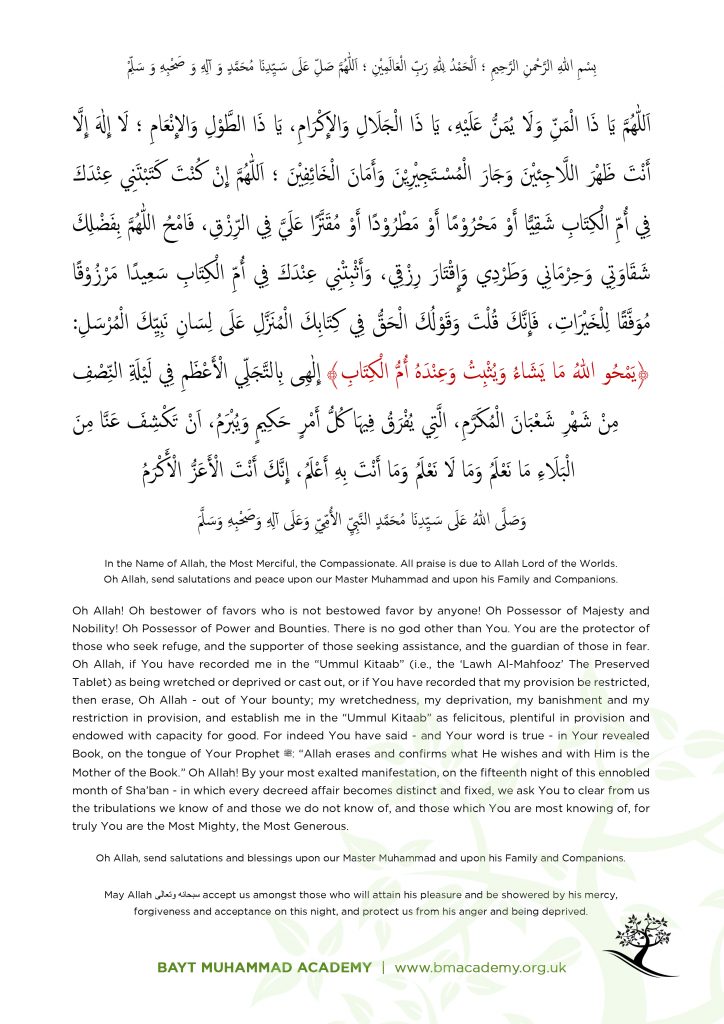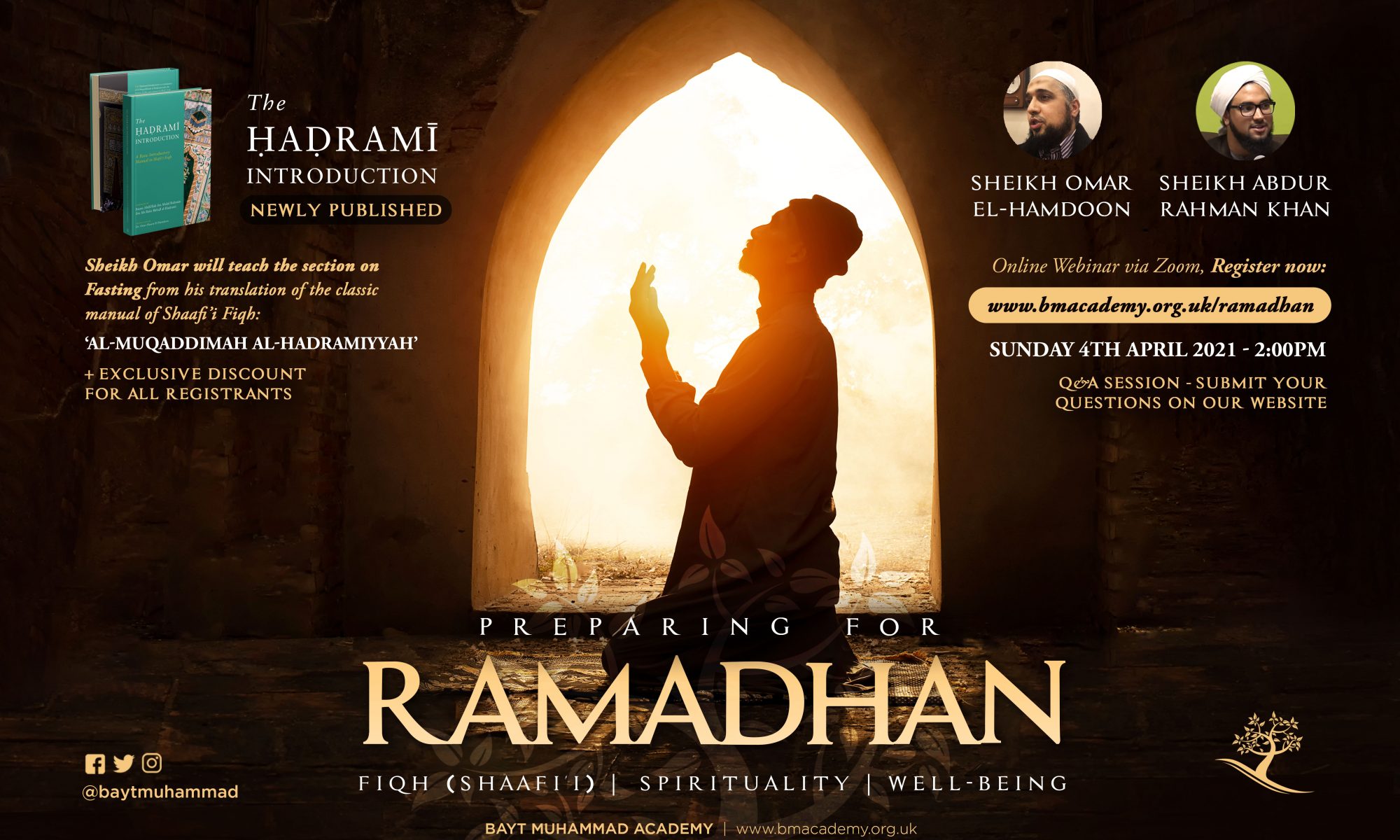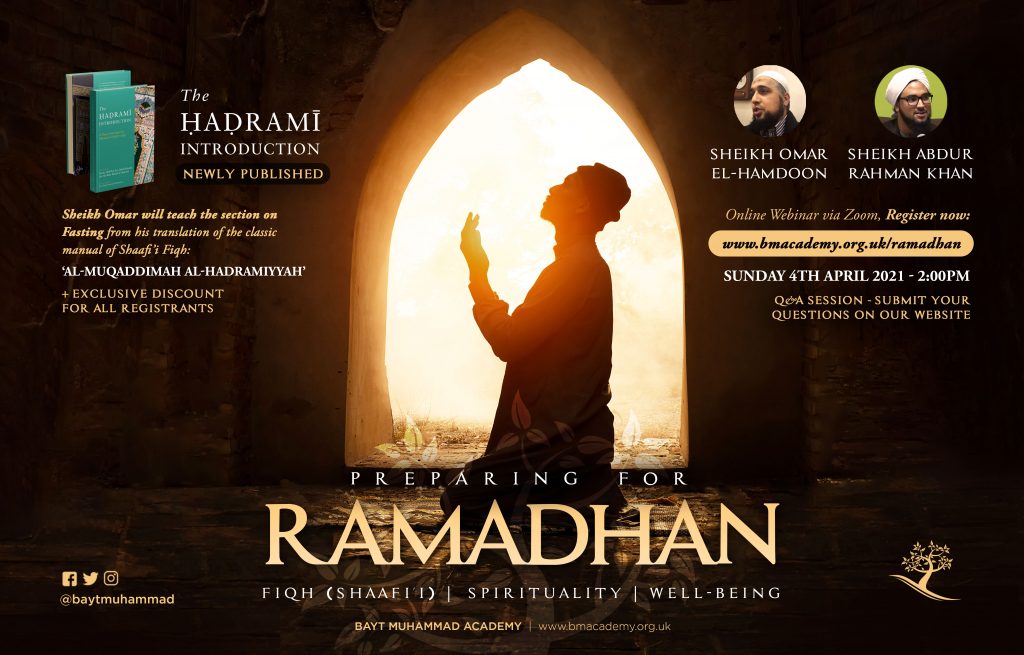Throughout the past fourteen centuries, our esteemed scholars have endowed the status and virtue of the 15th of Sha’ban through their actions and statements. Following their deep quest for the knowledge of the Qur’aan, Hadith, Tafseer (Commentary of the Qur’aan), and after contemplating upon their sincere connection with Allah سبحانه وتعالی and His Beloved Messenger ﷺ, they came to realize the value of this night. They saw it as an opportunity to detach one’s self from this distractive world, and connect to the remembrance of the Lord of the Worlds. They saw it as the mid-most night of a month that has been praised in its virtue and extolled in its blessings throughout the Ahaadith of Our Beloved Prophet ﷺ. A night in which every Muslim can strive to embark upon the path of rectification and attain a portion of utmost blessings and bounties.
The great companion of the Prophet ﷺ – Sayyidinaa Abdullah Ibn Umar رضی الله عنه – was known for being the closest in emulating every minute detail of the Prophetic Sunnah. He رضی الله عنه became known by this salient feature, whilst in the presence of his father Sayyidinaa Umar Ibn Al-Khattab رضی الله عنه, and the most senior companions who followed the Prophet ﷺ in the highest extent of Ittibaa’ (Obedience and Emulation). This great companion was so close in following the practices of the Prophet ﷺ, that his actions and statements have been utilized as supporting evidence in matters as high as Fiqh (Jurisprudence), to further clarify aspects of Prophetic Practice. This great companion tells us in a statement narrated from him رضی الله عنه:
عَنِ ابْنِ عُمَرَ، قَالَ: ” خَمْسُ لَيَالٍ لَا يُرَدُّ فِيهِنَّ الدُّعَاءُ: لَيْلَةُ الْجُمُعَةِ، وَأَوَّلُ لَيْلَةٍ مِنْ رَجَبَ، وَلَيْلَةُ النِّصْفِ مِنْ شَعْبَانَ، وَلَيْلَةُ الْعِيدِ وَلَيْلَةُ النَّحْرِ
“There are five nights in which Du’aas are not rejected; The night of Jumu’ah (Thursday Night), the first night of Rajab, the midmost night of Sha’ban, the night before Eid al-Fitr,
and the night before Eid al-Nahr.” (Shu’b Al-Imaan)
The greatest scholars of the earliest generation recognized the value of this night as a means of Du’aa and supplication to Allah سبحانه وتعالی, and took it as opportunity to connect with their Lord and be forgiven in the vastness of His infinite mercy. The legendary scholar of Islam, and one of the four primary scholars of this Ummah – Imaam Ash-Shaafi’i رحمه الله – spent his entire life studying and mastering every field of knowledge that would enable him to reach a deep, holistic understanding of the Islamic tradition. He spent seventeen-years just on the language, grammar and linguistic essence of the Qur’aan, Hadith, and all authoritative Islamic texts. After his life-long study, and his observation of the pious predecessors, Imaam Ash-Shaafi’i رحمه الله stated:
إنَّ الدُّعَاءَ يُسْتَجَابُ فِي خَمْسِ لَيَالٍ فِي لَيْلَةِ الْجُمُعَةِ، وَلَيْلَةِ الْأَضْحَى، وَلَيْلَةِ الْفِطْرِ، وَأَوَّلِ لَيْلَةٍ مِنْ رَجَبٍ، وَلَيْلَةِ النِّصْفِ مِنْ شَعْبَانَ
“Indeed, Du’aas are accepted in five nights; in the night of Jumu’ah, the night of Eid Al-Adha, the night of Eid Al-Fitr, the first night of Rajab, and the mid-most night of Sha’ban”
(Kitaab Al-Umm)
It is narrated that Sayyidah A’ishah رضی الله عنها saw the Prophet ﷺ praying in the night, supplicating at the graveyard of Baqi’, as this was the night in which Allah سبحانه وتعالی forgives his slaves in vast multitude, asking them: “Is there anyone seeking forgiveness from Me so that I may forgive him? Is there anyone seeking provision from Me so I may provide for him? Is there anyone suffering so I may relieve his suffering?” (Tirmidhi, Ibn Majah)
Whilst there are certain evil traits that can deprive a person of acceptance and incur punishment at any given time, it is especially true of such virtuous nights. Thus, it is also narrated that the following people will be deprived of any benefit on this night:
- Those who equate others with Allah سبحانه وتعالی
- Those who possess hatred or rancor in their hearts for their fellow Muslims
- Those who commit Zina (Fornication/Adultery)
- Those who sever bonds of kinship with family relative
- Those who violate the rights of their Parents.
May Allah سبحانه وتعالی protect us from ever being included amongst them and grant us the Tawfeeq (Ability) to avoid such actions.
إِنَّآ أَنزَلْنَـٰهُ فِى لَيْلَةٍۢ مُّبَـٰرَكَةٍ ۚ إِنَّا كُنَّا مُنذِرِينَ ؛ فِيهَا يُفْرَقُ كُلُّ أَمْرٍ حَكِيمٍ
“Indeed, We sent it down during a blessed night. Indeed, We were to warn [mankind]. Therein [i.e., on that night] is made distinct every precise matter” (Surah Al-Dukhan 44:3-4)
Some of the Mufassireen (Commentators of the Qur’aan), have opined that these verses contain an indication of reference to this blessed night of Sha’ban. They have commentated that the momentous task of the Qur’aan’s descension to the first heaven and beyond was initiated on the mid-most night of Sha’ban, and reached completion on Laylah Al-Qadr (The Night of Decree). Likewise, they offer the conclusion that the decree of the following year begins to descend from Al-Lawh Al-Mahfooz (The Preserved Tablet above the Seven Heavens) on this night, after which it reaches the realm of angels and they are then briefed upon their duties, until the Decree is concluded by the Lord of the Worlds on Laylah Al-Qadr.
The Sha’ban of the Pious Scholars
Reflecting upon these points above, in addition to the vast corpus of Islamic texts, the pious scholars would maximize the benefits and acceptance of this night in a manner inspired by various Ahaadith of the Prophet ﷺ. They would supplicate – and teach others to supplicate – with a Du’aa formulated upon the various injunctions reported regarding this night, such as mercy, forgiveness, fulfillment of needs, prosperity of life etc., and likewise seek protection from the warnings transmitted in regards to those deprived in this night, supplicating via the correct manner and formation of Hamd (Praise) and Salawaat as instructed in various Ahaadith of the Prophet ﷺ.
Prior to supplicating, they would maximize their Du’aa by fortifying its acceptance through the Prophetic injunction of Surah Al-Yaseen, which is reported to be a means of Allah سبحانه وتعالی fulfilling the needs of its reader (Sunan Ad-Daarimi). They would formulate three intentions and place their hopes in the infinite mercy of Allah سبحانه وتعالی for their acceptance and fulfillment, reciting Surah Al-Yaseen once for each intention, followed by their Du’aa. Thus, they would adopt the following style of supplicating to Allah سبحانه وتعالی in this blessed night:
- Have sincere hope in Allah سبحانه وتعالی for the fulfillment of each intention,
- Recite Surah Al-Yaseen for each intention,
- Complete each recitation by making Du’aa to Allah.
Step-by-step Method:
- They would first recite Surah Al-Yaseen with the intention of being blessed with a long life in the obedience of Allah سبحانه وتعالی, thereafter supplicate with their Du’aa (which can be found below).
- They would then recite the second one with the intention of calamities being diverted, followed by their Du’aa.
- Then finally, they would recite the third one with the intention of being self-sufficient from people and being blessed with a virtuous death, followed by their Du’aa.
The Du’aa they would recite after each recitation of Surah Al-Yaseen is as follows:
بِسْمِ اللهِ الرَّحْمنِ الرَّحِيمِ ؛ اَلْحَمْدُ لِلّٰهِ رَبِّ الْعَالَمِيْنِ ؛ اَللّٰهُمَّ صَلِّ عَلَى سَيِّدِنَا مُحَمَّدٍ وَ آلِهِ وَ صَحْبِهِ وَ سَلِّمْ
اَللّٰهُمَّ يَا ذَا الْمَنِّ وَلَا يُمَنُّ عَلَيْهِ، يَا ذَا الْجَلَالِ وَالإِكْرَامِ، يَا ذَا الطَّوْلِ وَالإِنْعَامِ ؛ لَا إِلٰهَ إِلَّا أَنْتَ ظَهْرَ اللَّاجِئيْنَ وَجَارَ الْمُسْتَجِيْرِيْنَ وَأَمَانَ الْخَائِفِيْنَ ؛ اَللّٰهُمَّ إِنْ كُنْتَ كَتَبْتَنِي عِنْدَكَ فِي أُمِّ الْكِتَابِ شَقِيًّا أَوْ مَحْرُوْمًا أَوْ مَطْرُوْدًا أَوْ مُقَتَّرًا عَلَيَّ فِي الرِّزْقِ، فَامْحُ اللّٰهُمَّ بِفَضْلِكَ شَقَاوَتِي وَحِرْمَانِي وَطَرْدِي وَإِقْتَارَ رِزْقِي، وَأَثْبِتْنِي عِنْدَكَ فِي أُمِّ الْكِتَابِ سَعِيدًا مَرْزُوْقًا مُوَفَّقًا لِلْخَيْرَاتِ، فَإِنَّكَ قُلْتَ وَقَوْلُكَ الْحَقُّ فِي كِتَابِكَ الْمُنَزَّلِ عَلَى لِسَانِ نَبِيِّكَ الْمُرْسَلِ: ﴿يَمْحُو اللهُ مَا يَشَاءُ وَيُثْبِتُ وَعِنْدَهُ أُمُّ الْكِتَابِ﴾ إِلٰهِی بِالتَّجَلِّي الْأَعْظَمِ فِي لَيْلَةِ النِّصْفِ مِنْ شَهْرِ شَعْبَانَ الْمُكَرَّمِ، الَّتِي يُفْرَقُ فِيهَا كُلُّ أَمْرٍ حَكِيمٍ وَيُبْرَمُ، اَنْ تَكْشِفَ عَنَّا مِنَ الْبَلَاءِ مَا نَعْلَمُ وَمَا لَا نَعْلَمُ وَمَا أَنْتَ بِهِ أَعْلَمُ، إِنَّكَ أَنْتَ الْأَعَزُّ الْأَكْرَمُ
وَصَلَّى اللهُ عَلَى سَيِّدِنَا مُحَمَّدٍ النَّبِيِّ الأُمِّيِّ وَعَلَى آلِهِ وَصَحْبِهِ وَسَلَّمَ
Translation: “In the Name of Allah, the Most Merciful, the Compassionate. All praise is due to Allah Lord of the Worlds. Oh Allah, send salutations and peace upon our Master Muhammad and upon his Family and Companions.
Oh Allah! Oh bestower of favors who is not bestowed favor by anyone! Oh Possessor of Majesty and Nobility! Oh Possessor of Power and Bounties. There is no god other than You. You are the protector of those who seek refuge, and the supporter of those seeking assistance, and the guardian of those in fear. Oh Allah, if You have recorded me in the “Ummul Kitaab” (i.e., the ‘Lawh Al-Mahfooz’ The Preserved Tablet) as being wretched or deprived or cast out, or if You have recorded that my provision be restricted, then erase, Oh Allah – out of Your bounty; my wretchedness, my deprivation, my banishment and my restriction in provision, and establish me in the “Ummul Kitaab” as felicitous, plentiful in provision and endowed with capacity for good. For indeed You have said – and Your word is true – in Your revealed Book, on the tongue of Your Prophet ﷺ: “Allah erases and confirms what He wishes and with Him is the Mother of the Book.” Oh Allah! By your most exalted manifestation, on the fifteenth night of this ennobled month of Sha’ban – in which every decreed affair becomes distinct and fixed, we ask You to clear from us the tribulations we know of and those we do not know of, and those which You are most knowing of, for truly You are the Most Mighty, the Most Generous.
Oh Allah, send salutations and blessings upon our Master Muhammad and upon his Family and Companions.“
–
May Allah سبحانه وتعالی accept us amongst those who will attain his pleasure and be showered by his mercy, forgiveness and acceptance on this night, and protect us from his anger and being deprived.




